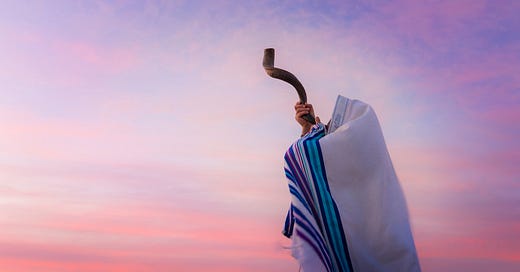What Jews In The Pews Would Choose
Following up on readers’ preferences for High Holy Days sermons.
Sermons that count: Do these troublesome times call for greater action or deeper reflection? Or both?
Based on the dozens of thoughtful responses I received to my recent query about the issue readers would most want to hear addressed from the pulpit on the High Holy Days (click here), it seems clear that many of us are experiencing “loneliness and despair.” Indeed, several respondents used that exact phrase, anticipating a third consecutive Rosh Hashanah and Yom Kippur under the cloud of Covid. In these troubling times we look to our rabbis for guidance in addressing our discomfort, and clergy may be looking to us for a sense of the community .
At least one of the several pulpit rabbis who responded is eager to learn how readers weighed in : “Let me know what people say!” wrote David-Seth Kirshner of Temple Emanu-El in Closter, NJ.
Two primary messages emerged from the writings on my post’s thread and in direct emails to me. One was a plaintive plea for rabbis to find ways to promote more tolerance, respect and dialogue among Jews to counter the toxic divide that threatens the very fabric of our community. “There is really only one thing that all rabbis should talk about this holiday season,” wrote Jack Saltzman. “Sinat chinam [causeless hatred], the tormenting of any other Jew,” which “is intolerable.”
A respondent identified only as Doron called for “bold and clear visions” from synagogues to be places where all types of Jews could “be in community with one another.” And Cindy Chazan urged synagogues to “create communities within communities … to help people feel connected.”
The other key directive was to address a palpable sense of foreboding as American political and societal norms have deteriorated, anti-Semitism increases and war rages in Europe. These are not normal times.
Barrie Weiser noted that Zev Jabotinksky tried, in vain, to convince European Jews in the 1930s to save themselves from “the storm” of fascisim that the Revisionist Zionist leader warned was coming. “Is it coming” to this country “or perhaps it is already here?” Weiser questioned. “Are we choosing to ignore it or to do something to avert a catastrophe?”
Can rabbis make a case for optimism, given all the world’s woes at the moment? David Lowenfeld would like to hear that issue addressed based on renewed faith, and particularly in terms of having and raising Jewish children today. Pam Ehrenkranz would welcome an action-oriented message from the pulpit to reflect “real change rather than inspiration,” with a focus on increased roles for women in traditional Orthodox congregations.
Several respondents urged rabbis to emphasize the importance of democracy to our society, and the deep concern that it is far more fragile than we realize. Renee Cherow O’Leary wants rabbis to talk about what democracy is and how it can be preserved. She asked: “Can the leaders of all faiths find ways to help create new dialogues about saving our earth, our cultures, and respect diversity and the beauty of the universal quest for God, meaning and purpose in every faith?”
Stuart Himmelfarb called for rabbis to explore “the intersection of politics and Jewish values” to help “navigate these difficult times” even if “this can be a minefield” and divide some congregations. How sad, I thought, that an attempt to counter threats to democracy in the context of commitment to faith is likely stir up complaints of bringing partisanship into religion. I would counter that the expression of and support for sacred American and Jewish principles is davka (intentionally at the very core of our faith.
Consider: The congregation I belong to offers a prayer for the U.S. government each Shabbat which begins, “Ribon kol ha-olamim, Ruler of the Universe, please protect America’s democracy and bless us, the people of the United States, who have established the Constitution and laws of this country.” It continues: “Enable us and our chosen representatives to act justly, to love mercy, and to walk humbly with You, our God. Inspire us to lift a lamp of welcome and kindness and to proclaim liberty throughout the land for all its inhabitants…Strengthen the hands of those who guard America’s freedoms and protect them from harm. El Rachum, Compassionate God, plant love, peace and friendship among us, and uproot all hate and envy from our hearts. Give us the wisdom to select leaders who revere truth and despise corruption.”
If this prayer makes some uncomfortable, as I suspect it may, woe unto us. Let those who find its text and message partisan consider the Biblical prophets, revered in large part because they were lonely, unwelcome voices speaking truth to power. We read their words for inspiration, reflection and repentance.
It is no coincidence that on Yom Kippur, the holiest day of the year, our sages chose a Haftorah from the Prophet Isaiah, who chides the people with a powerful message. He tells them that their fasting is insincere in the face of injustice. What God wants, he asserts is “to let the oppressed go free … to share your bread with the hungry and to take the wretched poor into your home. When you see the naked, to clothe him… Then shall your light burst through like the dawn and your healing spring up quickly… Then, when you call, the Lord will answer.” (Ch. 58, v. 6-9)
The prophet concludes that if you “banish the menacing hand and evil speech … then shall your light shine in darkness and your gloom shall be like noonday.” (Ch. 58, v.10)
Too political?




